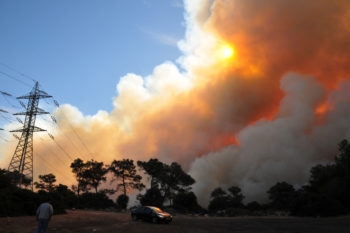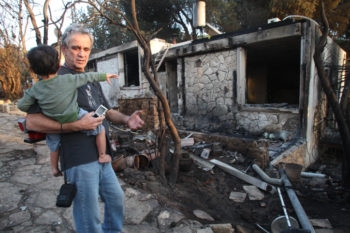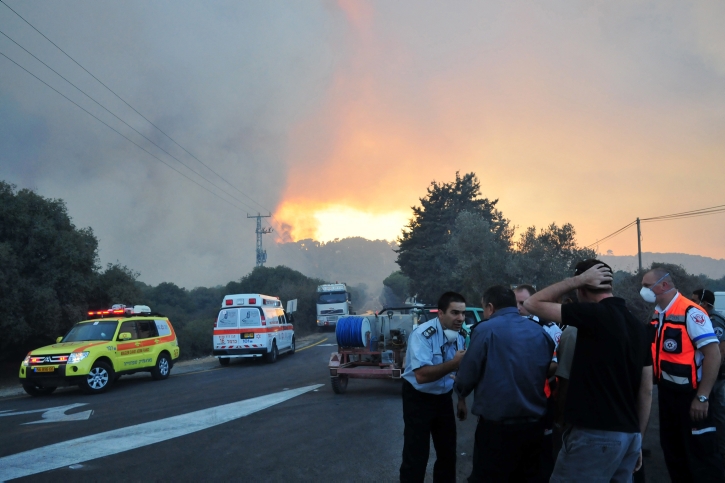
At least 40 Israelis have been killed in a forest fire in northern Israel described as out of control, Dec. 2, 2010. (Flash90)

At least 40 Israelis have been killed in a forest fire in northern Israel described as out of control, Dec. 2, 2010. (Flash90)

Father and son look at their house in Ein Hod, near Haifa, that was burned down in the fire that ravaged the Carmel Forest, Dec. 5, 2010. (Meir Partush/Flash 90)
JERUSALEM (JTA) — In a country always on guard to prevent the next tragedy born of terrorism or war, an out-of-control forest fire was the culprit in a tragic bus incident that left some 40 people dead in northern Israel.
The bus, carrying police cadets from Israel’s prison service, became stuck Thursday morning among burning trees that fell on the road, trapping dozens inside who were on their way to evacuate prisoners from the path of the blaze. Most of the bus passengers were killed. Footage of the burned-out shell of the bus was broadcast throughout Israel.
Meanwhile, evacuations spread as the fire raged, with more than 17,000 residents told to leave their homes. Israelis elsewhere in the country were urged to take them in. On Friday, the death toll reached 42.
High winds and dry conditions — Israel’s winter has been almost rainless so far — provided fuel for the blaze that erupted in the Carmel Mountains near Haifa. By Thursday night the fire had scorched more than 2,500 acres in northern Israel.
“We lost all control of the fire,” a Haifa firefighting services spokesman told the Israeli daily Haaretz. “There aren’t enough firefighting resources in Israel in order to put out the fire.”
As firefighters flocked to northern Israel, Israeli Prime Minister Benjamin Netanyahu appealed to the United States, Greece, Cyprus, Italy, Germany and Russia for help controlling the blaze. Greece and Spain each sent four planes, while Cyprus sent a plane and a helicopter.
Defense Minister Ehud Barak ordered the Israel Defense Forces to mobilize to help control the blaze and assist in evacuating the wounded. Several people have been reported missing.
Netanyahu called the fire an “unprecedented disaster.”
“We have known difficult moments and, naturally, we will need to learn very many lessons in order to deal with disasters of this kind,” he said. “But right now all of our efforts are directed to saving lives and also watching over the lives of the forces dealing with the disaster.”
Netanyahu said he would declare a national day of mourning when the fire is extinguished and there is time to mourn.
“A horrible disaster has fallen upon us,” he said. “I shall declare it a national day of mourning, but right now we haven’t the time to mourn and investigate.”
Chief Rabbi Shlomo Amar called a special prayer service for late Thursday at the Western Wall. The Chief Rabbinate urged the public to join the worshipers at the Western Wall or pray at home.
Initial reports said that the fire began in an illegal dumping ground. The Israeli Environmental Protection Agency has disputed this claim.
ZAKA, a rescue-and-recovery agency, said in a news release Thursday that its volunteers had discovered a pile of about 15 bodies, one on top of another.
“This shocking and horrific sight would suggest that these people, who were on the bus, were trying to flee to safety from the fire and, with nowhere to escape to, embraced and perished,” the statement said.
According to the statement, Hezki Farkash, ZAKA’s operations commander in the Northern Command, reported that four of the agency’s teams were working at the site, and a larger team of volunteers was scanning the mountain to collect the remains of the charred bodies.
Another team completed its work, he said, ensuring that all human remains were removed from the bus itself. Farkash said the remaining ZAKA volunteers were assisting with identifying the bodies.
ZAKA team leader Abraham Danziger said in the statement that “The terrible smell of the charred bodies which is hanging in the air will remain with me for a long time. Some of the bodies are in a very bad condition, and we are working hard to identify them.”
Another ZAKA volunteer, Dudi Rosenberg, said it was “the most difficult and complex incident that we have ever had to deal with in the northern region. The volunteers recovered the bodies even as the fire continued to rage. I cannot find the words to describe the terrible sight of people who were burned alive as they were trying to escape.”
“The awful scenes of tens of bodies lined up one next to the other, completely burnt, that reminds me of images from the Holocaust,” said ZAKA team leader Raphael Mant. “It was extremely chilling.”






